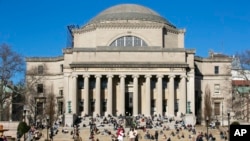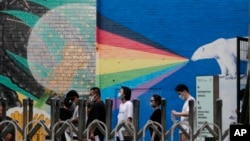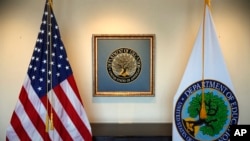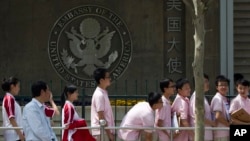Student Union
Millennials Make the Move to Smaller Cities

New York is out. (Way out.) So are Los Angeles and Chicago.
Houston, Denver, Dallas and Sea-Tac (Seattle and Tacoma) — even Columbus (Ohio) and Riverside (California) — are the new magnets for millennials.
People between the ages of 25 and 34 are eschewing larger, expensive metropolises for smaller cities that offer more affordable housing and a lower other cost of living, according to a recent Brookings Institution evaluation of the U.S. Census Bureau's American Community Survey Five-Year Estimates.
This internal migration is changing the map as the United States grows, settles and prospers, Brookings said.
"Millennials, a highly educated and diverse generation now squarely in their late 20s and 30s, are forming the backbone of various regions' emerging labor forces and consumer bases," wrote Brookings' demography expert William Frey.
Brookings measured the movements of millennials and baby boomers — Americans 55 and older — from 2004 to 2017, with special attention paid to the Great Recession in 2007-2008, when the economy sank after a national banking and credit crisis. Jobs were hard to come by, especially for millennials entering the market with little experience. Carrying a large amount of student debt and few work options strangled their ability to marry, have children and buy homes.
"Young adults are still far from reaching their earlier mobility levels, despite occasional upticks in recent years," wrote Frey. "For them, the impact of the recession in terms of delayed marriage, home buying and childbearing appears to continue — even as the economy has heated up."
Top choices
Which cities took on a new appeal for millennials?
Houston, Dallas, Seattle-Tacoma, Austin, Charlotte, Portland (Oregon), Riverside, Phoenix, Nashville, Atlanta, Columbus, Las Vegas, Minneapolis, Sacramento and Raleigh, in descending order. San Francisco came in 17th, while Sunnyvale (in California's Silicon Valley region) ranked 29th in increased millennial population.
The biggest losers were New York, Los Angeles, Chicago, San Diego, Miami, Boston, Philadelphia, New Orleans, Milwaukee, Washington (D.C.), Pittsburgh, Buffalo, Tucson, Rochester (New York), Cleveland, Hartford, Baltimore, St. Louis and Louisville.
Among states, Texas gained an average 32,318 millennials a year between 2012 and 2017. Washington state gained 18,174; Colorado, 16,156; Oregon 7,542; and Arizona, 5,742.
New York lost 37,217 young people per year during the same period, with Illinois seeing 17,884 millennials move out. New Jersey lost 7,100; Massachusetts, 6,353; Alaska, 6,038; Pennsylvania, 5,210; and Washington, 4,092. California lost 2,325 millennials.
Living expenses
The cost of rent — another measure of migration movement — increased from January 2018 to January 2019 in destination cities, and stalled in some cities that lost millennial population. Las Vegas showed the largest average rent increase of $80 per month; but, at an average rent of $1,048, Sin City remains affordable for millennials, according to RentCafe, a nationwide apartment search website.
Phoenix, another southwest growth city attracting people from more expensive West Coast states, saw a $72 per month rent increase. Again, the average rent is a manageable $1,018, RentCafe reports.
San Diego (up 6.4 percent), Nashville (up 6.2 percent), and Los Angeles (up 6 percent) were among the largest cities with the fastest increases in average rents, RentCafe reported. Nashville's average rent of $1,347, however, came in far lower than the average of $2,460 in Los Angeles and $2,184 in San Diego.
Queens, New York, was the only large city where rent fell since last January, by 0.2 percent to $2,196. Houston grew only 0.8 percent, and the East Coast cities of Boston and Baltimore both saw meager 1.1 percent increases in average rent since January 2018.
So, how much income does a millennial need to afford rent in some of these cities?
According to SmartAsset, a financial technology company, renters need about $123,000 a year to live in some of California's larger cities; $163,000 in New York City; $108,000 in Washington, $50,400 in Charlotte, and $39,300 in Columbus, Ohio.
Please share your thoughts in the Comments here, and visit us on Facebook, Twitter, Instagram and LinkedIn.
See all News Updates of the Day
- By VOA News
International students discuss US campus culture shock

International students at De Anza College in Cupertino, California, talked about culture shock in an article in La Voz News, the student newspaper.
"It felt like a major culture shock. Everything was so different, from academics to mannerism," said a student from Mexico.
Read the full story here.
These are the most expensive schools in the US

High tuition costs along with housing and food expenses can add up for students at U.S. colleges and universities.
MSNBC looked at the most expensive schools in the country, with one costing more than $500,000 for a bachelor’s degree. (June 2024)
Uzbekistan students admitted into top US universities

Students from Uzbekistan are among the international students admitted to top colleges and universities in recent years.
Gazata.uz profiled some of the Uzbekistan students attending Harvard, Brown, Princeton and other U.S. universities. (June 2024)
- By Stella Hsu
Reports of visa checks, deportations worry Chinese STEM students in US

Geopolitical tensions and growing competition in tech between the United States and China appear to be spilling over into academia despite commitments from the world’s two biggest economies to boost people-to-people exchanges.
The United States remains the top choice for Chinese students seeking to study abroad with nearly 300,000 studying in American colleges and universities during the 2022-2023 school year. But reports of some cases that students and professors are facing extra scrutiny while passing through immigration and the deportation of others are raising concerns.
For Chen Xiaojin, a doctoral student studying semiconductor materials at a university in the Washington, D.C., metropolitan area, it has been six years since she returned to her hometown of Beijing.
At first, it was the COVID-19 pandemic that kept her from going home. But over the past two years, she has been deterred by accounts of Chinese students majoring in science and engineering being required to reapply for their visas upon returning to China.
She also says she is worried by reports over the past six months of Chinese students being deported, even at nearby Dulles Airport.
"My current research is relatively sensitive, and my boss [adviser] is getting funds from the U.S. Department of Defense, making it even more sensitive,” she told VOA. "I am afraid that I won't be able to return after I go back [to China]."
Chen says that if she did return to China, she would have to apply for a new visa.
In a report late last month, Bloomberg said it had found at least 20 Chinese students and scholars with valid visas who were deported at U.S. Customs since November and barred from reentry. The U.S. Customs and Border Protection Agency does not release relevant data.
Immigration attorney Dan Berger represented one Chinese student who was deported late last year. He tells VOA Mandarin that the student studied biological sciences at Yale University and was about to complete her doctorate.
She visited her family in China and got a new visa but was deported by customs at Dulles Airport and barred from reentering the country for five years. Berger said he did not see anything suspicious in the transcript of the conversation between the student and the customs officer.
"We have seen what seems like a pattern over the last six months of Chinese PhD students being turned around…. more than I've seen in quite a while," he said.
Matthew Brazil, a fellow at the Jamestown Foundation, said neither country seems willing to explain the situation. However, he believes that in most cases, the United States must have valid reasons for blocking visa holders from entering the country.
In some cases, the student’s background may not match what is written on the visa application. In other cases, customs agents may also find something that the State Department missed, and once they see it, they are responsible for taking action.
"I wish the Chinese side would be specific about their students who were refused entry,” he said. “The fact that both sides are mum on details and that the Chinese side is engaged with the usual angry rhetoric means that each has security concerns. And that says to me that there was good reason for the U.S. to stop these particular applicants."
Brazil also sees a connection between the entry denials and export control regulations issued by the United States in October 2022 that restrict China's ability to obtain advanced computing chips, develop and maintain supercomputers, and manufacture advanced semiconductors.
U.S. Customs and Border Protection is one of the law enforcement agencies authorized to investigate violations of export control regulations, he said.
"Beijing's intelligence agencies are known to focus attention on PRC [People's Republic of China] students and scientists headed abroad who study or work on dual-use technologies controlled under the Export Administration Act — compelling Chinese students and scientists to report on what they've learned when they return to China on holiday,” he said. “This has been true for decades."
Bill Drexel, a fellow for the Technology and National Security Program at the Center for a New American Security, said the U.S. government did find some cases where students tried to steal strategic technology for China.
"I think it would both not be surprising that they found some really questionable or incriminating evidence for some students,” he said. “It would also not be surprising if, in their hunt for really solid evidence, they also may have made some mistakes on other students.”
Drexel adds that “it’s just kind of an unfortunate fact of the time that we live in and the tactics that the CCP uses when it comes to these measures."
In a post on X in early May, U.S. ambassador to China Nicholas Burns tried to dispel concerns about visas and entry to the United States for students and scholars. In the post, he said "99.9% of Chinese students holding visas encounter no issues upon entering the United States.”
In an interview with The Wall Street Journal Monday, Burns said it is China that is making it impossible to promote people-to-people ties. Burns told the Journal that students attending events sponsored by the United States in China have been interrogated and intimidated.
He also said that since U.S. President Joe Biden and China’s leader Xi Jinping held their summit in San Francisco last year, China’s Ministry of State Security and other agencies had interfered with Chinese citizens’ participation at some 61 events.
At a regular briefing on Wednesday, Chinese Foreign Ministry spokesperson Mao Ning dismissed those accusations, saying that they did not “reflect reality" and that went against key understandings reached by both countries’ presidents in San Francisco.
“The United States, under the pretext of 'national security,' unjustifiably harasses, interrogates, and deports Chinese students in the U.S., causing them significant harm and creating a severe chilling effect,” Mao said. “The image of the United States in the minds of the Chinese people fundamentally depends on the actions of the United States itself.”
Drexel said he believes Burns’ comments about visas and students' willingness to study in the U.S. still ring true.
“On balance, it's still the case that American universities are overwhelmingly warm towards Chinese students and want them in large numbers," he said.
However, Berger, the immigration lawyer, is concerned about the chilling effect recent cases involving Chinese students could have.
"In general, we are being more careful about advising Chinese graduate students in STEM fields about traveling and letting them know that there is some small risk,” he said.
Even though the risk is small, it does seem to be real at the moment, he said.
Adrianna Zhang contributed to this report.
US federal judge blocks new regulation targeting for-profit colleges

A federal judge in Texas has blocked a regulatory provision targeting for-profit colleges that was scheduled to take effect in July 2024.
Times Higher Education reports that the rule, which would affect student loans, was challenged by for-profit institutions. (June 2024)










